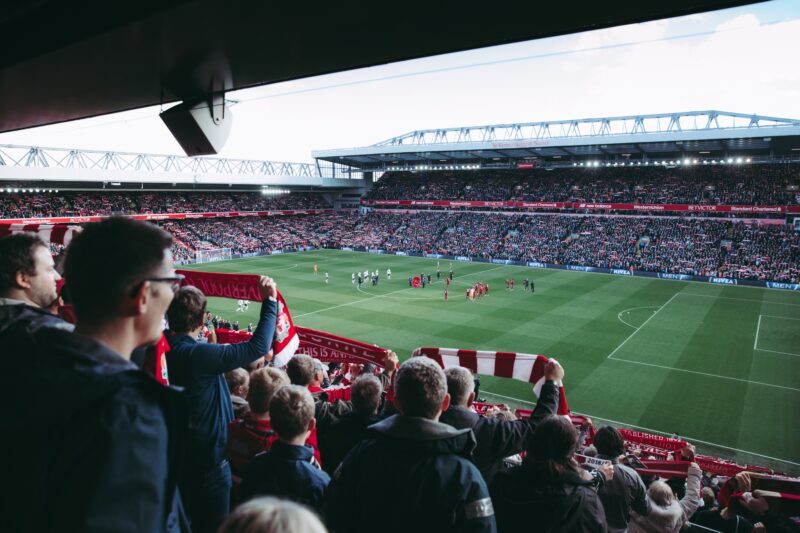Ownership is everything – why sport mustn’t turn its back on blockchain
Even with the hype surround the metaverse dying off and NFTs losing their shine, don’t right off the benefits of blockchain, iStories founder Lee Robson writes – especially if you’re in sports.
Just as technology has served to change the fabric of sports brand management and IP exploitation over the past 30 years, so will be the case for the next 30 years through the transformative power of blockchain technology.
Don’t be fooled by the ebbs and flows of news cycles and investor sentiment. Web3 will be a part of sports’ future in a big way, and the reality is that right now Australian sports brands, and brands that leverage sport, are not ready for it.

Hype around metaverses has undeniably cooled over the past year or so, the result of Meta’s inability to offer an attractive mainstream product, combined with the limelight-grabbing arrival of AI.
NFTs too have lost their shine, as countless brands and creators who rushed to create projects without clear roadmaps, utility, or the ability to follow-through on grand ambitions, have seen the well of buyers dry up as crypto winter deepened.
Rather than the abrupt end of a short-lived fad, what we’re witnessing with Web3 right now is classic Gartner Hype Cycle stuff, as brand and consumer adoption slips from the peak of inflated expectations toward the trough of disillusionment.
However, the danger for all brands, with sport chief among them, is their failure to look far enough ahead to realise that on the other slide of this adoption slump lies Gartner’s inevitable slope of enlightenment.
In doing so, sports brands excitedly developing next season’s launch campaigns are handing over the long-term competitive advantage to those who are right now building sports experiences with the next ten years in mind.
To understand the risk and opportunity, one has to take a brief jaunt back to the 1990s and the birth of the read-only ‘Web1.0’ iteration of the Internet, when content creation lay with professional publishers and interaction was limited.
Then came Web2.0, known as the read/write phase, which still prevails today, characterised by interactivity, social connectivity, and user-generated content, powered by mobile internet access, smartphones, and provided by tech giants.
New on the scene is Web3, defined as the read/write/own phase of the Internet, allowing users to become participants and stakeholders in digital experiences, rather than relying on centralised platforms to facilitate those experiences as overarching custodians.
The word every sports brand with an interest in fandom should be poring over here is ‘own’.
All sports fans have ever wanted is to get ever closer to their passions, with Web3 now providing a transformative bridge to that obsession.
While Australian sports brands are among the best in the world at generating fan engagement in the physical and Web2.0 worlds, there’s yet to be a significant and meaningful effort made to stake a claim to Web3 by promising to put digital ownership into fans’ hands. And yet, which sports fan hasn’t dreamt of owning their own sports club or racehorse?
That dream is now very within reach, and there are already creators out there taking significant strides towards putting this level of ownership into fans’ hands.
Some lack a measure of subtly and ingenuity, such as Binance’s latest NFT collection with Cristiano Ronaldo, in which fans are given the chance to “possess” NFTs, minted as digital collectibles commemorating key moments in the soccer player’s career.
More eye-opening though, are projects building Web3 experiences and ecosystems with the potential to lure sports fans away from traditional sport by combining ownership with stewardship.

One such project currently in development is Footium, a Web3 soccer management simulation with all the hallmarks of classic strategy video games, such as squad and tactics management. The big difference with Footium is that players actually own the clubs they manage, purchased as NFTs and providing their owners with the ability to buy and sell players on the blockchain, expand their stadiums, amass their own legions of fans, and even sell their clubs for a profit, if they become successful enough.
Since the dawn of organised sport, fans have believed they can make better decisions than their club’s manager or board; Web3 gives them the ability to put their money and over-confidence where their mouth is. And once they’ve had a taste of it, some fans may find it a hollow experience to go back to sports brands that only offer surface level interactions without the depth delivered by blockchain-powered ownership.
It’s also important to remember that it’s not all one-way traffic. Web3 projects still have a significant mountain to climb when it comes to convincing more conventionally minded consumers and sports fans to take the leap, with Footium’s sponsorship of English pro soccer club, Leyton Orient, being just one example of Web3-native brands dipping back in the physical world with purpose and budget.
So how can Australia’s sports brands, currently winning in Web2, make sure they don’t give up the ground they’ve worked so hard over previous decades to obtain?
When it comes to the viability of the metaverse — irrespective of whether or not Mark Zuckerberg is able to make Horizon Worlds a success — brands need to be aware of the swathes of other Web3 worlds currently in development (catering for a full spectrum of tastes and interests) that carry with them integration opportunities for sports brands to build their own worlds within worlds.
Then there’s the opportunity to create interoperable Web3 branded assets, which fans can acquire and move between various third-party on-chain environments, allowing them to take their sports assets and allegiances with them.
And for those bold enough, there is infinite space on the blockchain for brands to build their own fully owned digital domains.
The truth is though, that sports brands in Australia don’t need to listen to any of this to continue successfully driving fan engagement for the foreseeable future.
It’s the future that isn’t so foreseeable that they need to begin building for right now.

Lee Robson is founder and director of iStories, a strategic storytelling agency working with Web3 brands and blockchain businesses. He is also a member of the jury for this year’s Mumbrella Sports Marketing Awards.

You should have opened and closed on “Brands in Australia don’t need to listen to any of this”
User ID not verified.
Have your say